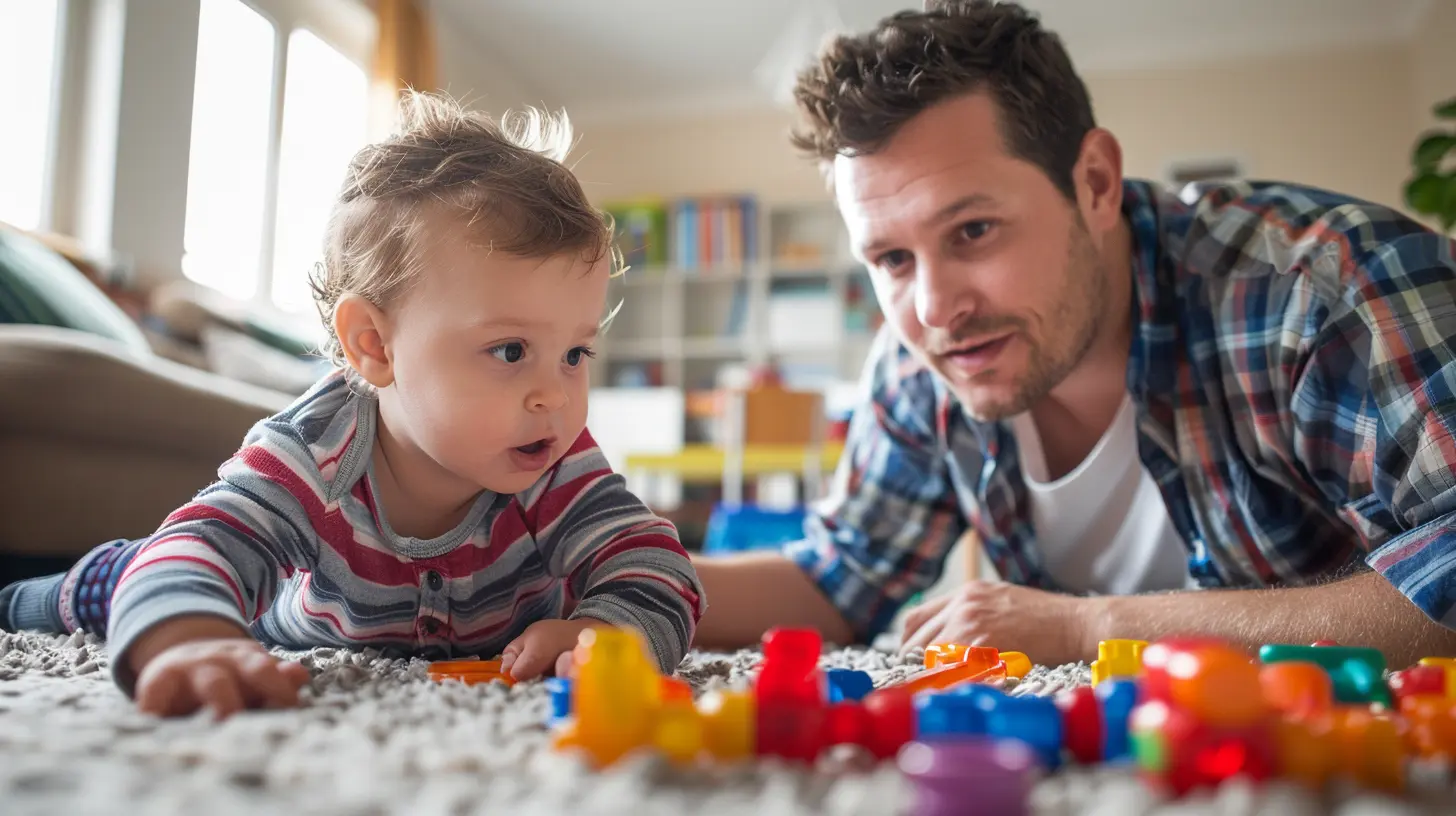Co-Parenting Through the Toddler Years: What to Expect
26 November 2025
Co-parenting is tough. Let’s just put that out there. You’re trying to raise a tiny human amidst a whirlwind of diaper explosions, tantrums, “why” questions, and nap-time negotiations — and you're doing it alongside someone you no longer live with. That’s not exactly a recipe for smooth sailing. But here's the thing: it doesn’t have to be a constant battle.
Raising a toddler is no small feat for any parent. Add co-parenting into the mix, and well... things can get a little more complicated, but they don’t have to be chaotic. So, how do you navigate co-parenting during the toddler years without losing your mind or your cool? Glad you asked.
Let’s break it down, real talk, no sugar-coating — just honest advice that’ll help you stay sane and support your little one along the way.
What Co-Parenting Really Means (Especially With a Toddler in Tow)
Co-parenting is exactly what it sounds like — two people working together to raise a child after separating or divorcing. But here’s the catch: toddlers are emotionally intense little creatures. They're just starting to figure out who they are, and they rely heavily on consistency and connection.So when Mom and Dad (or Mom and Mom, Dad and Dad — every family looks different!) are no longer under the same roof, everything feels different to your toddler too.
But co-parenting isn't just about switching weekends or exchanging passive-aggressive texts about who forgot to pack the sippy cup. It's about showing your child that love, stability, and unity can thrive even in separate households.
Why the Toddler Years Are Extra Tricky
Toddlers are in a wild developmental stage. Think about it: they’re learning to talk, test boundaries, express wants, and gain independence — all at once. Now, toss in shuffling between two homes, maybe two parenting styles, and maybe even new partners or siblings... yeah. It's a lot.Some common toddler-age challenges that hit harder when co-parenting include:
- Separation anxiety: Going back and forth can stir emotional confusion.
- Behavioral regressions: Potty training setbacks, clinginess, even tantrums may spike.
- Sleep disturbances: Toddlers crave routine, and sudden changes can throw everything off.
- Discipline inconsistencies: Differing rules across households can confuse your child and lead to acting out.
But here's the good news — toddlers are also incredibly adaptable. With a little teamwork (and a lot of patience), you can guide them through this phase while building a co-parenting plan that works for everyone.
Setting Up a Co-Parenting Plan That Doesn’t Drive You Nuts
Okay, first things first — if you don’t have a clearly outlined co-parenting plan, stop reading right now and go make one. Seriously. We'll wait.Got it? Good. Here's what a good co-parenting setup should include:
1. Consistent Schedules
Toddlers crave structure. Knowing what to expect makes them feel safe. Try to keep transitions between homes predictable — same days, same times. If you can, align nap times and bedtimes to avoid sleep chaos.2. Unified Discipline
“Dad lets me eat cookies before dinner!” Sound familiar?You don't have to parent identically — let’s be real, even married couples differ — but some consistency helps. Discuss consequences for common issues like biting, tantrums, or bedtime stalling so your little one knows what to expect no matter where they are.
3. Routines That Cross Households
From bath-time songs to favorite bedtime stories, routines matter. Try to mirror routines when possible. If your toddler always dances to "Baby Shark" before brushing their teeth, carry that over to both homes. Little things make a big difference.4. Shared Calendar and Notes
Use a shared app or calendar for everything — doctor appointments, playdates, daycare schedules, nap times, etc. Communication gaps = chaos. The goal is not to micromanage, but to stay on the same page.
Communication: The Real MVP of Co-Parenting
Let’s be honest — if communication was easy, you'd still be together, right?But now, it’s not about your past. It's about your kid's future. You don’t have to be best friends, but you do have to be partners.
Tips for Keeping It Civil (and Maybe Even Friendly):
- Keep it kid-focused: Ask yourself, “Is what I’m about to say helpful for our child’s well-being?”- Use tools: Texts, emails, co-parenting apps — whatever keeps things concise and civil.
- Don’t vent to the kids: Complain to your therapist, your bestie, your journal — just not your toddler.
- Practice neutrality, even when it’s hard: Respond, don’t react. It saves you so much emotional energy.
- Be flexible when it matters: Kids get sick, plans change — a little give-and-take goes a long way.
Remember, clear, consistent communication is the backbone of successful co-parenting. That, and coffee. Lots of coffee.
Supporting Your Toddler Through the Transitions
Your little one didn’t sign up for two homes, two routines, or two sets of rules. They’re just along for the ride. So putting some emotional padding around their experience is crucial.Here’s how you can help them adjust:
Keep Goodbyes Short and Sweet
Long, dramatic farewells = emotional overload. Make handoffs upbeat and brief. A hug, a “Have fun with Daddy!” and off you go. Toddlers take emotional cues from you.Create Comfort in Both Homes
Let your child have stuff at both houses that feels familiar — a favorite stuffed animal, the same nightlight, their own toothbrush. Feeling at home in both places helps them feel secure.Watch for Red Flags — and Act Early
If your toddler’s mood or behavior takes a nosedive, don't ignore it. Regression, aggression, sleep issues — these can all signal stress. Talk to your co-parent, and if needed, consult a child therapist. Early support can turn things around.Validate Their Feelings
Toddlers aren’t too young to feel grief, confusion, or anger — they just can’t express it the way adults can. Acknowledge their emotions, even if they can't exactly articulate what they're feeling. Say things like, “It’s okay to miss Daddy,” or “It’s hard going back and forth sometimes, huh?”What If You’re Dealing with a Difficult Co-Parent?
We’d love to say every co-parenting situation is sunshine and teamwork, but some dynamics are just... well, messy. Maybe your ex doesn’t respect the schedule. Maybe they're emotionally unpredictable. Maybe they never respond to texts unless it’s about child support.Here’s how to handle it without pulling your hair out:
- Set boundaries: Be clear about what’s acceptable — and stick to it.
- Document everything: Keep a paper trail. It can protect you and your child if legal issues arise.
- Use a neutral tone: Think “business-like” rather than emotional.
- Lean on professionals: Mediation, counseling, and sometimes even court — don’t be afraid to bring in backup.
And above all — don’t bad-mouth your co-parent in front of your child. It causes confusion, pain, and long-term emotional damage. Your toddler deserves to love both parents without guilt.
Real Talk: Self-Care Isn't Optional
You can't pour from an empty sippy cup.Being a co-parent during the toddler years means constantly switching roles — caregiver, communicator, disciplinarian, peacemaker — all while dealing with your own feelings.
Make room for:
- Sleep (easier said than done, we know)
- Therapy or support groups
- Time with friends who lift you up
- Exercise, even if it’s a walk with the stroller
- Silly time with just you and your toddler to connect
This isn’t just about survival — it’s about thriving through one of the most intense parenting seasons there is.
The Bottom Line? It's Not Easy, But It's Worth It
Co-parenting a toddler won’t ever be perfect — but perfect isn’t the goal. The goal is to give your child a sense of security, love, and stability, even when life isn’t picture-perfect.You won’t always see eye to eye with your co-parent. There will be awkward drop-offs, forgotten belongings, and times you’ll want to bite your tongue into little tiny pieces. But there will also be proud parenting wins, laughter, and moments when your toddler looks at both of you with wide, trusting eyes — like you’re superheroes. Because, to them, you are.
Whether you're new to co-parenting or knee-deep in toddler chaos, just remember: you’re not alone. You’ve got this. One toy-strewn step at a time.
all images in this post were generated using AI tools
Category:
Co ParentingAuthor:

Karen Hurst
Discussion
rate this article
1 comments
Mabel Wolf
Navigating co-parenting during the toddler years can be challenging yet rewarding. Remember to communicate openly, prioritize consistency, and focus on your child's needs. Embrace flexibility and patience, as this phase is crucial for their development. Collaboration will strengthen your parenting partnership.
November 26, 2025 at 5:34 AM

Karen Hurst
Thank you for your insightful comment! Open communication and collaboration are indeed key to navigating co-parenting during this crucial stage.


